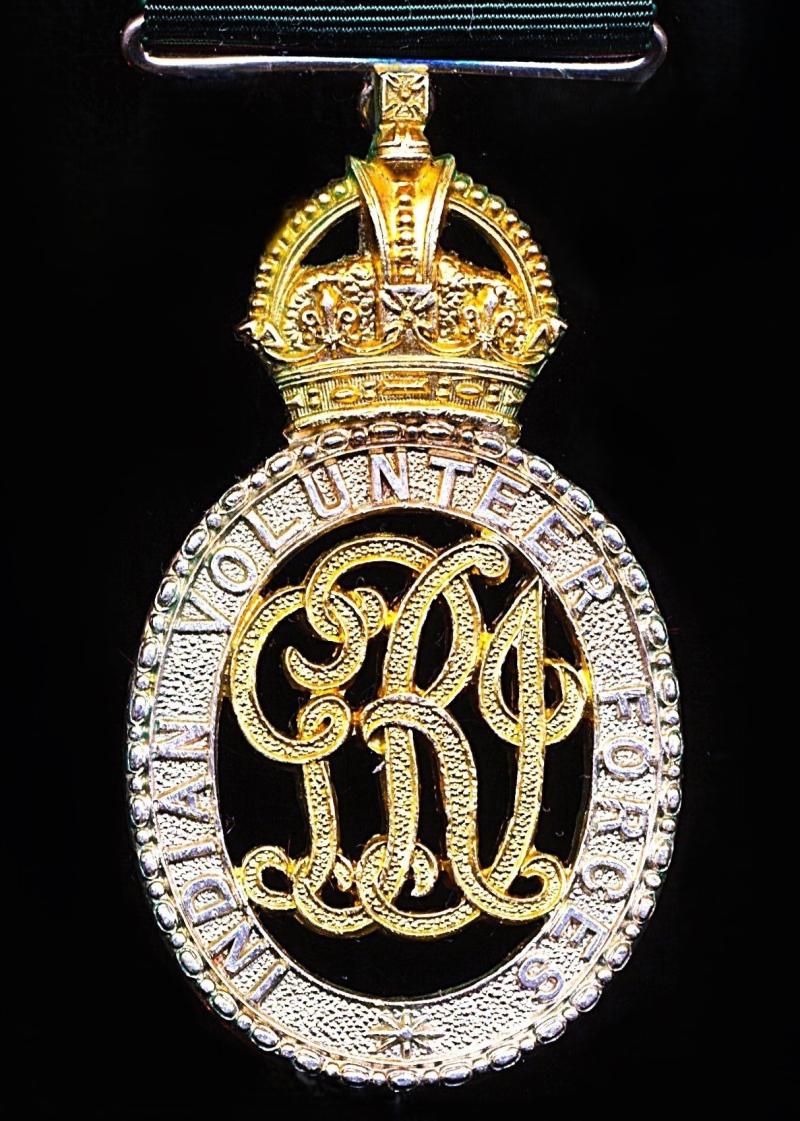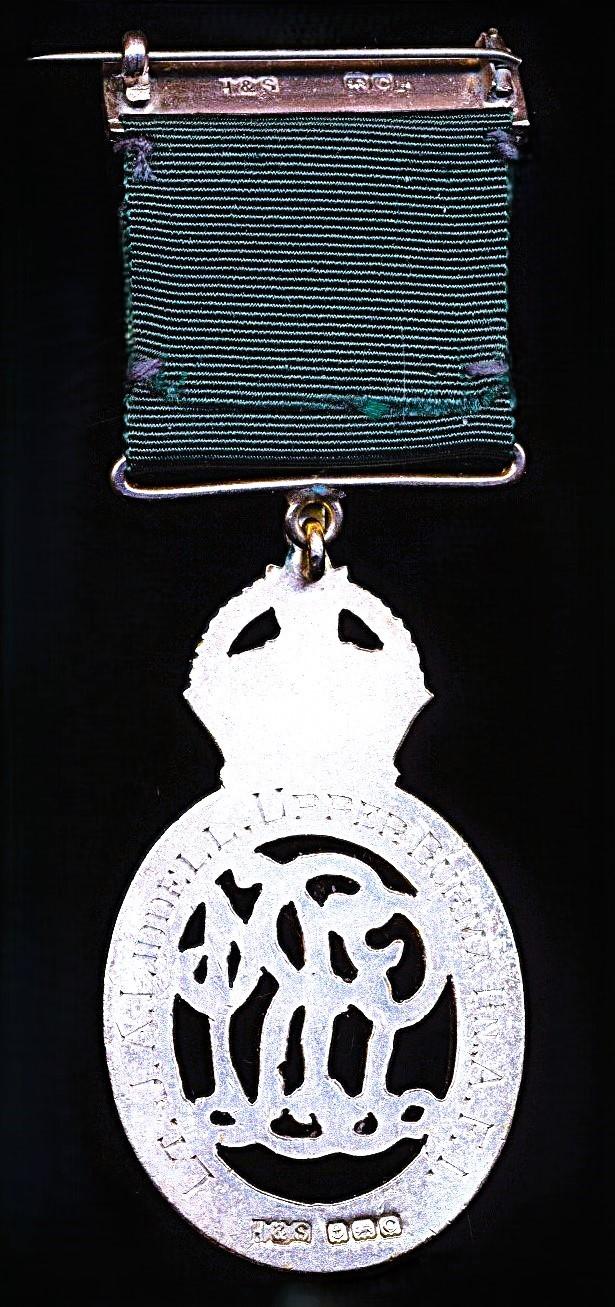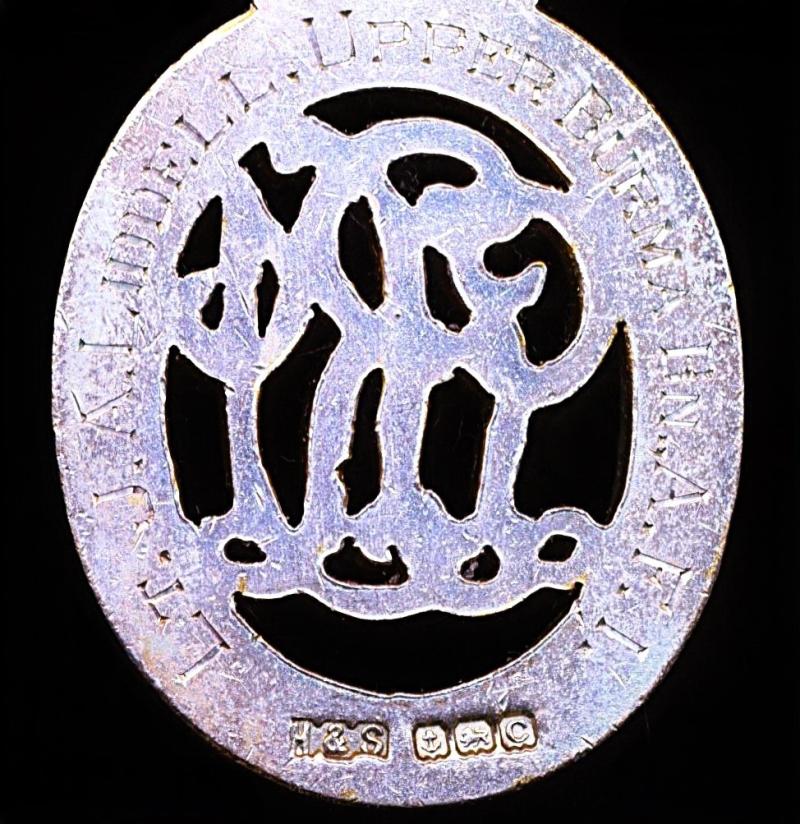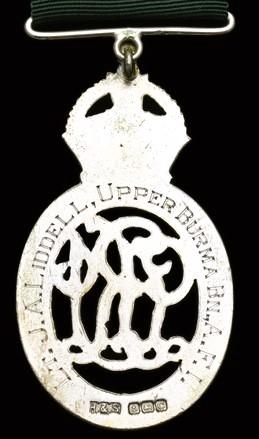Indian Volunteer Forces Officers Decoration, GV issue with integral hallmarked top riband brooch bar (Lt. J. A. Liddell, Upper Burma Bn., A.F.I.)
The insignia complete with its integral top riband brooch bar, this with English silver hallmarks on reverse for Birmingham 1927. With long hinged pin and clasp fittings on reverse of brooch bar
James Alexander Liddell, of Scottish ethnicity, was the third son of Alexander Murdoch Liddell (the last ADC to the Governor of Prince Edward Island) and Katherine Eliza Liddell (nee Swabey), was born at Halifax, Nova Scotia, Canada, on 13 March 1885.
James, was commissioned 2nd Lieutenant on 20 November 1914 into the 7th Hariana Lancers of the British Indian Army. He first served overseas in the Force "D" Mesopotamia theatre from 8 October 1915. The Regiment had fought in the Battle of Shaiba where on 13 April 1916 Major Wheeler received a posthumous Victoria Cross. They would lose a squadron in the actions at Kut-Al-Amara and they returned to Bolarum in October 1916. Liddell rose to Captain (1914-15 Star Trio - issued by the Government of India).
He became Lieutenant with the Upper Burma Battalion on 29 October 1921 at Pyiamana and remained at that rank for his entire service. He later worked for the Steel Bros & Company Limited and died in Kenya in 1955.
Medals Verification: In addition to the Indian Volunteer Decoration, it is known that Lt-Colonel James Alexander Liddell, IVD, was also entitled to the below following campaign medals for the Great War and Second World War, per the cited referenced sources:
- 1914-15 Star: Medal Index Card shows Captain 7th Hariana Lancers, entered theatre of war Force 'D' (Mesopotamia) 08/10/1915
- British War Medal. Silver issue: Medal Index Card confirms award to be issued by Government of India
- Interallied Victory Medal: Medal Index Card confirms award to be issued by Government of India
- Mention-in-Despatches (An Oakleaves Emblem): An award for Mesopotamia published in the London Gazette issue of 13 July 191
- The 1939-45 Star. No clasp: British Army Second World War Medal Index Card refers
- The Burma Star. No clasp
- Defence Medal
- War Medal
- Indian Volunteer Decoration: Gazette of India issue of 23 November 1929
A most interesting lengthy article - including a captioned photograph of Major Liddell in Officers Service Dress - pertaining to Major Liddells adventurous life in Burma, was published in the Worthing Gazette issue of, 19 May 1943, which we are herunder quoting in full:
Quote,
By The Old Moulmein Pagoda
Ex Worthing Golf Club Captains Adventures
"That gold is where you find it" can be converted into anything else worth hunting for i have discovered in my own incessant search for news: for, "a story is where you find it" is equally true, as I have proved true times without number to my own satisfaction.
Therefore I was not surprised to find that a rugged-faced, stalwart man, tanned deeply by the sun and with that indefinable look of the far away places in his eyes, sitting at the next table to mine, at aperitif time, should prove an interesting subject for a story.
I strolled across to his table and casually suggested that the weather in Worthing was becoming decidedly tropical. He smiled an replied that it was not as hot as where he expected to be shortly.
That started it but I had to trail him, all the way out to the Worthing Golf Club before I could get his story.
He turned out to be Major James Alexander Liddell, Worthing Golf Club Captain, 1936-1937.
Born in Nova Scotia, Major Liddell has had a most adventurous life both before and after coming to live in Worthing.
GOLFING ENTHUSIAST
His father was the last A.D.C. to the Governor of Prince Edward Island, and he sent his son James to school at Glasgow when he was ten years of age.
Major Liddell later went to Glasgow University, remaining in Scotland till he was 20.
Here it was that he took up two of his life's two chief pursuits, forestry as a career and golf as a pastime.
Forestry took him to jungles of Burma, and golf, ia Gleneagles and Carnoustie, linked him up with Worthing.
Like all Scotsmen he proved reticent, and I had a hard job to get him to speak of his exploits.
"I went first to Burma, 33 years ago", he said, "and my job with the Forestry Department took me all over Burma".
'On the Road to Mandalay and all that,' I facetiously remarked. "You know your Kipling, of course?"
Major Liddell laughed.
"Don't go on quoting that to me," he said. "I've watched the Hathis piling teak myself, not only that but I have trained hundreds of them to do it 'in the sludgy, squdgy creek, where the silence 'ung that 'eavy you was 'alf afraid to speak.'"
"The funny part of it is that Kipling's line, 'By the old Moulmein Pagoda, looking eastwards to the sea,' is all wrong - for the old Moulmein Pagoda faces the other way."
I looked my incredulity. Surely my boyhood's poetic idol could not have made such a mistake?
"Oh yes, he did," he anticipated my question. "I have every cause to remember the old Moulmein Pagoda, for it was while the lady by my side and I were sitting on it that I proposed to her."
HIS EARLY CAREER
When the last war broke out Major Liddell left Burma to join the 7th Bengal Lancers as a subaltern. He went with to "Mespot'," where he was galloper to General Townsend (sic), and managed to get out of "Kut" just before the Turks closed the gates when they besieged it.
In 1916 he returned to India and transferred to the Persian Cordon, to which he acted as Staff Officer at Duzdap. Major Liddell also served in the Afghan War of 1919.
Afterwards he went back to Burma, where he stayed till 1935. He then went to Nova Scotia to settle his family affairs there, but found it too cold after his long sojourn in the East.
Coming to England from his homeland, he came down to Worthing to visit some friends at the Worthing Golf Club.
Major Liddell and his wife took a fancy to the place and promptly attempted to settle down here.They bought a house on the golf course, and Major Liddell became Captain of the Worthing Golf Club between 1936-1937.
He also invested in the nurseries with Gray Bros. at South Farm-road and their other branches.
Then this war broke out and Major Liddell was recalled to the Army as a gunner officer. He had to start all over again as a subaltern but is now restored to his former Majority rank.
I steered him round again to speak of his experiences in Burma, and asked him about the Mayu Peninsula where most of the fighting against the Japs is now taking place.
"The Mayu Peninsula," replied Major Liddell, "is actually where I first started work in Burma. It is hilly, swampy, wet and tidal, and very difficult country to fight over, especially in the monsoon from May to September."
THE WAYS OF ELEPHANTS
Major Liddell had some strange and interesting things to say on the habits and ways of elephants.
"I have been connected for many years on and off with Elephant Transport in Burma, and had a lot to do with their training and breeding."
"I've had as many as 700-800 of them under my charge."
"They are very tractable but very slow to pick up their tuition. They can only be taught to understand a few words of command which takes them a long time to get into their big heads, but once they learn to know them, they never forget them.
"Elephant's working lives," remarked Major Liddell, "are conducted very much like those of mankind. They start work when between 18-21 years of age and retire from 58-64.
"Moreover" he continued,"elephants already trained for military purposes with artillery batteries, are no good on being returned to transport work. They are so used to different words of command and discipline, and having had their food always brought to them while in the 'Army,' they refuse to leave the lines and forage for themselves as they have to do in civilian life.
"The Government ration, according to the regulations in the old books, was 1,000 Lbs. of fodder per day per elephant.
"Out of which," declared Major Liddell, "they eat 700 lbs. and waste 300 lbs.
"Nowadays, we fetter them on four legs and turn them loose to scrounge for themselves, eked out by grain and sugar-cane, with a few odds and ends by way of dessert, such as pine-apples, bananas and tamarind.
"I once bought a whole plantation of sugar-cane," he said "in order to feed my elephants while on trek.
"THERE'S A BURMA GIRL A-SETTIN',
"I can't understand how the sons of my dear old friends among the Burmese became disloyal, as unfortunately has been the case according to official reports. The Japs must have undermined their old fealty to the British Raj and bought them over to their side, which is much to be regretted.
"I hope when I get out there again I'll find that that some of the stories I've heard about their disloyalty will not turn out as bad as they have been reported."
"I'm in Worthing on a farewell visit," he explained, "before returning to the East, and I'm looking up all my old golfing and other friends of former days."
I wished him luck on his new adventures and left him taking leave of his old clubmates and looking forward to seeing the "Old Moulmein Pagoda" again.
(RUSS-IN-URBE)
Uquote.
A rare example of the Indian Volunteer Decoration named to a Burma volunteer unit
Condition: About EF
Code: 24875







